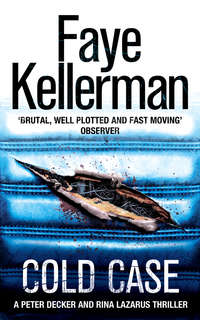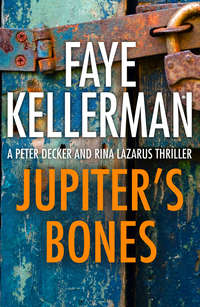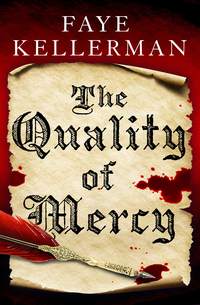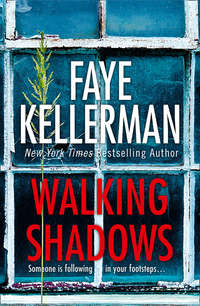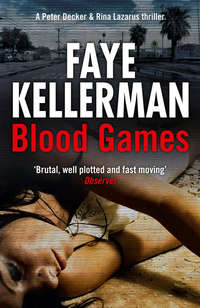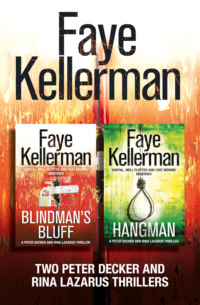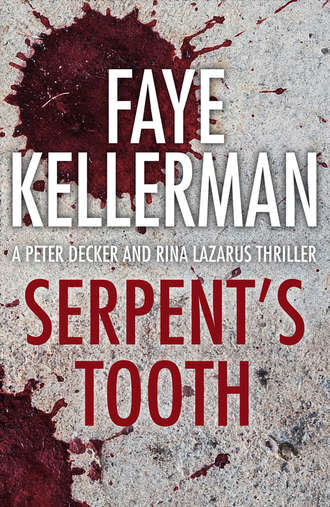
Полная версия
Serpent’s Tooth
Decker’s eyes glanced at the newspaper on his desk. A couple of days had passed, but Estelle’s was still front-page news. He spoke quietly. “Would it help if you looked again?”
“We were very thorough.” Marge smoothed out the leg of her beige pants. She wore lightweight fabrics today—white cotton shirt, viscose pants. But if the weather continued its cooling trend, it would be time for the wools. “I’ll show you our grid maps if you want. Right now it doesn’t look like much … a mass of dots.”
“We marked every place where we extracted a bullet or found an empty casing,” Oliver explained.
Bert Martinez twirled the ends of his bushy mustache, his stocky frame bowing the seat of the folding chair. “Whole damn case is starting to smell fishy. Anyone show the Loo Harlan’s autopsy report?”
Decker sat up. “When did that come in?”
“You were in a meeting with the mayor, city council, and Strapp,” Marge said. “We tried paging you …”
Decker grimaced. He’d forgotten to pick up a new pager.
“How’d that go?” Oliver was concerned. “Are our asses on the line?”
“Why should our asses be on the line?” Martinez asked. “We’ve got the perp … of sorts.”
“Lawsuits, right?” Oliver said. “Police should have showed up sooner, right? If they had, more lives would have been saved, right? What was time of arrival on that one? Something like two minutes?”
“First cruiser arrived in two-twenty-eight,” Webster said.
Oliver said. “Am I right, Deck?”
“Close.”
“No matter what happens, we’ll get blamed. Earthquake could drop the city into the center of the earth, it would be our fault.”
“For the time being, the Detective division isn’t a point of concern.” Decker paused. “But if this turns out to be … how should I say this? If this is something more than a straightforward mass murder, the focus will shift to us. Who has that autopsy report?”
“That would be me.” Webster handed the folder to Decker, his blue eyes focused, alert. Today, Tom was dressed in a black suit, sunglasses dangling from his jacket pocket. Looked more FBI than LAPD with his permapressed Anglo good looks. Suave manner. But Decker didn’t hold it against him. Webster was a damn good cop.
Decker thumbed through the pages, eyes working like strobes. “What should I be looking for?”
Webster drawled, “The bullet that killed Harlan Manz. It was fired at a range consistent with a distance of around two to two and a half feet—”
“What!” Decker raced through the report. “Where?”
“Page eleven or twelve. I marked it with a pencil.”
Decker fast-forwarded to the paragraph. Read it once, then read it again. He sat back in his chair, ran a hand down his face.
Martinez said, “I called up the morgue … asked if they were sure about that distance.”
“And?”
“They were sure. Said that if the gun had been fired at a closer range, more damage would have been done to the brain.”
Webster said, “Bigger entry and exit holes, more tearing and ripping, more extensive powder burns on the hands and temple.”
“So when Harlan fired, he looked something like this?” Oliver made a gun with his fingers, extended his arm from his shoulder, then flexed his wrist so that his fingers were pointing back to his temple. “What’s this, guys? About three feet?”
“Anyone have a measuring tape?” Marge asked.
Decker pulled one from his desk, gave it to Marge.
Marge measured. “Thirty-seven inches. Bend your elbow a little bit, Scotty.”
Oliver complied, his elbow making a hundred-and-fifty-degree angle. “Now I’m pointing over my head.”
“So lower your arm.” Martinez got up, positioned Oliver as if he were a Gumby. “There. About like this. That looks like two and a half feet.”
Marge measured. “Thirty-one inches to be exact.”
Webster said, “Now point to your head.”
Oliver did so, maintained the pose. They stared at him.
Marge said, “Might be me, but I think he looks awkward.”
Martinez said, “He looks ridiculous. You want to pop yourself, you put the gun to your temple. You don’t hold it two feet away.”
Marge said, “You know, I could understand someone holding the gun away from his head if he had doubts or wasn’t used to a firearm. Almost like an avoidance thing.”
“Maybe at a little distance,” Martinez said. “But not in the position Scotty’s in. Unless you like contorting.”
“Maybe he had short arms,” Marge suggested.
“Not that short,” Martinez answered.
“Could it have been a misfire?” Oliver asked.
Martinez made a face. “You mean he was aiming for someone and caught himself in the head?”
“No. I mean the gun just accidentally went off.”
“Catching him square in the temple?” Marge was dubious.
“Excuses, excuses.” Webster shook his head. “Why aren’t we saying what we’re all thinkin’?”
“Two shooters,” Oliver said.
“Just what you said yesterday, Loo,” Marge said.
Oliver said, “You did?”
Decker replied, “I was looking over some of the victims’ autopsy reports. Some of the bullet trajectories were inconsistent with a one-killer theory.”
“And you didn’t like the number of bullets we recovered.”
“A lot for one shooter,” Webster said. “Even for someone using a double automatic. What did we recover? Something like two hundred bullets?”
Martinez said, “Two killers means Estelle’s was planned.”
Oliver said, “What do you mean by planned, Bert?”
“Harlan went into Estelle’s with the intention of killing someone specific. He and his cohort masked it by popping others. Like putting a bomb in an airplane to collect insurance.”
“A hit gone bad,” Marge said. “If so, next step is to figure out who the intended target was.”
Webster said, “So y’all take a look at the victims.”
Decker said, “We need to look at the victims who might have crossed paths with Harlan in other capacities.”
Marge reached into her oversized purse and pulled out a sheet of paper. “Which brings us up to date with my current assignment. Discovering which victims—if any—belonged to Greenvale Country Club.”
“What’s this?” Webster asked.
Decker filled them in on Harlan’s job at the country club, on his conversation with Barry Fine, and on yesterday’s brainstorming with Marge. “Harlan Manz worked at Greenvale about two years ago. You know how snobs can be. Treating the hired help as nonentities. I was trying to determine if Harlan had a long-standing grudge against one of the restaurant’s victims.”
Oliver said, “Deck, if a grudge from Greenvale was the motive behind Estelle’s shooting, why didn’t Harlan shoot up the club?”
“Maybe security was too tight. Look, I don’t know any more than you do. But something’s hinky here.”
Oliver asked, “So you’re thinking that one of Estelle’s victims offended Harlan at the club and at the restaurant. And that’s why he went batshit?”
Decker said, “Just trying to find a connection.”
Marge asked, “Maybe you’d like to hear if there are any connections?”
Decker laughed. “We’re going on with these flights of fancy and we don’t even have facts. What do you have?”
Marge settled herself. “Okay. Table number twenty-two: People there were from Ashman/Reynard. A Realtor named Wendy Culligan was pitching to a bunch of Japanese businessmen. Some of the businessmen were murdered, but she survived … which made my job of asking questions a lot easier. The firm is a corporate member of Greenvale. Has been for the fifteen years since the club opened.”
“Is she a member?” Oliver asked.
“Through her business. Wendy’s been at the club maybe six times … goes there for power lunches. Theoretically, she could have crossed paths with Harlan.”
Oliver said, “But she’s still alive, Margie. She obviously wasn’t the target of a hit.”
Webster said, “Or maybe Harlan missed.”
“So what does Greenvale have to do with a bunch of Japanese businessmen who probably never set foot inside its doors?” Martinez asked.
Marge shrugged. “Well, they were making deals with Ashman/Reynard, Bert. Maybe Harlan was resentful of some of the realtors. So maybe he was trying to screw up the agency or block the deal.”
Decker wrote as he spoke. “What else do we have?”
Marge said, “Then we have Walter Skinner, the actor. He was also a member of Greenvale.”
Martinez said, “Now that was a real shame. I used to love him in High Mountain. Anybody remember that show?”
“Yo,” Oliver said. “Saturday morning, ten o’clock.”
“You coulda set your watch by me, I was that loyal a viewer,” Martinez said. “Remember the stampedes? Each episode had at least one stampede. All that sand and dirt and stomping hooves. Scared the shit outta me when I was a little boy.”
“Y’all see The Lion King?” Webster asked. “Took my son to see it. They had a cartoon stampede. Scared the shit outta him. Had nightmares for weeks.”
Oliver said, “Yeah, High Mountain always had a stampede or a twister. Couple times it was both.”
“Yeah, I remember that show!” Martinez said.
“The one where the wagon train stopped in Laredo, Texas,” Decker added.
“That’s the one!” Oliver said, bringing his hands to a clap. “God, that brings back memories. Man, wind was whooshing all over the place. And there was Walter—aka Cattle Foreman Kirk Brown—riding high in the saddle, barking orders, doing a jig with his horse, trying to bring in all those raging dogies while a tornado was blowing everything to shit.”
Marge said, “Maybe we could get back to the business at hand?”
The men stared miserably at her. Decker held back a smile. “So Walter was also a member of Greenvale?”
“Yes. A founding member,” Marge said. “Both he and his companion were murdered in their seats.” She looked at Decker. “Their table was right next to the Garrisons’.”
“Ah, interesting.” Decker took notes. “I haven’t gone over their entrance and exit wounds. Be interesting to see if it matches the patterns of the Garrisons.”
“Skinner and his companion …” Webster paused. “As opposed to a wife. By any chance, is there a wife?”
Marge said. “Yes, there is. Adelaide Skinner. I haven’t talked to her yet.”
The room went quiet.
Oliver grinned. “So the old goat was stepping out on her.”
“It doesn’t mean he deserved to die,” Marge said.
“Certainly I don’t think so. But his wife may have had other ideas.”
“So she hired someone to whack him by shooting up a restaurant?” Webster made a face. “How old is she anyway?”
“Seventy-seven,” Marge answered.
“Y’all picture a little seventy-seven-year-old lady telling someone to massacre thirteen innocent people just to get to her old man?”
“Maybe she hired out without knowing what the killers were going to do,” Oliver said.
Martinez said, “So they decided to execute the hit by attacking an entire restaurant? Pretty clumsy.”
“Worked in the past for the Mafia,” Oliver said.
Martinez added, “Then, for a topper, one of them decides to whack the other?”
“More money for himself,” Oliver said. “Plus someone to pin the blame on.”
Webster said, “Is Walter’s wife a member of Greenvale?”
“Yes, of course,” Marge said.
“Let’s slow it down,” Decker said. “We’re getting wild with our speculations. Any other connection, Marge?”
“Linda and Ray Garrison. From the people I’ve talked to, it’s clear that the couple was worth beaucoup bucks.”
“So who inherits the estate?”
“Don’t know for sure, but they have two adult children, a son and a daughter. David Garrison is twenty-six. And guess what? He has a record. Drug arrests. First time was probation. Second time, he served two years. He’s now out on parole. I’ve got a call in to his officer.”
“Good going, Dunn,” Webster said.
“Daughter Jeanine is completely different. Twenty-eight. A patron of the arts and theater and ballet. Very big in society events … raising money for charities. Now get this, guys! She specifically raises charity money with tennis matches.”
Oliver said, “Didn’t you say that Harlan taught tennis at Greenvale?”
“Yes, I did.” Decker’s intercom rang. He excused himself, took the call. A rape. Everyone from Sex Crimes was busy in the field. Did he want to send down someone from CAPs? Decker turned to Marge. The woman had been a top-notch Sex Crimes detective for six years. He had almost felt guilty when he pulled her away from the detail to follow him into Homicide. After the call was completed, he looked at Marge. “I need someone with experience, Detective Dunn.”
Marge checked her watch. “Sure, I can catch it.”
“Thanks.”
“Are we done here?”
“For the most part,” Decker answered. “Just let me get a couple of assignments out. Bert, you remember Walter Skinner as Walter Skinner the actor. Why don’t you go out to his house and feel out the wife?”
“Feel her up?” Oliver said. “Feel who up?”
“Out,” Decker said. “Feel her out. What are you doing now, Scotty?”
“I got a court case in a half hour. Meryl Tobias.”
Martinez groaned. “Mr. ‘I’m sorry, I’m sorry.’ What a stupid shit!”
“At least he was sorry,” Marge said.
“Don’t help Mrs. Tobias.”
Decker said, “What’s the DA going for?”
“Man one.”
“Cut-and-dried case?”
“Should be.”
“So when you’re finished, go over to Ashman/Reynard. Find out what business they were conducting at Estelle’s. While you’re there, check out the other agents, see if any of them had had prior contact with Harlan.” He turned to Webster. “You’re the youngest of the bunch, Tommy. You take on David Garrison.”
Oliver grinned. “Two young, good-looking white boys mentally duking it out.”
Marge said, “How do you know David Garrison’s good-looking?”
“I don’t know that he is,” Oliver said. “He just sounds good-looking. Aristocratic. Like he should have a ‘the third’ after his name.”
Webster said, “What about Jeanine Garrison, Loo?”
“You want to take her, Marge?”
“You mean after I catch the rape call?”
“That’s right. I’m going senile.” Decker glanced at the clock. “No, catch the call, then meet up with Scotty at Ashman/Reynard. I’ve got an open lunch hour. I’ll take Jeanine myself.”

The house was small, disappointingly so. Martinez hadn’t been expecting anything ritzy, but at least “Cattle Foreman Kirk Brown” should have been living in something western. A ranch house set on acres replete with tumbleweeds and cacti. Maybe a couple of horse stables. Instead, Walter Skinner, the man, had lived out his last years in a three-bedroom one-story bungalow in an anonymous residential block in the heart of the Valley. A simple house plopped onto a patch of recently fertilized lawn. A lifetime of nostalgia washed away by the stench of manure.
Badge in hand, Martinez trod up a red-painted cement walkway, hopped the two steps up to the porch. Knocked on the door, and when no one answered, he knocked again. This time he heard someone telling him just a minute. An elderly voice—not feeble, just old. A minute later, she opened the door a crack. Just enough room for Martinez to show her his ID. Then the door opened all the way.
She must have been under five feet, hunched over, hands resting on a cane. Her face was as round as the moon, lined but not overly wrinkled. Her cheeks had a dash of blush, her lips were painted pink. Her eyes were clear blue; her hair, thick and silver, was tied neatly into a bun. She wore a red turtleneck top over black pants, mules on her feet. Her hands were spotted, the fingers bony and bent. Though she had lived almost eight decades, she still struck a nice pose—all seventy-seven years and about eighty pounds of her.
One palm remained on the knob of her cane, the other extended itself to Martinez. “Adelaide Skinner. Pleased to meet you, Detective.”
Martinez took the birdlike hand. “Likewise. Thank you for letting me in.”
“I was afraid you’d arrest me if I didn’t.” A brief smile. “Come in, come in before you catch a chill.”
Martinez stepped inside. Adelaide closed the door. “Is this a condolence call from the police? Someone named Strapp already did that.”
“My captain.”
“A nice man. Sharp. A good politician.”
Martinez went inside the house. “Actually, I came to talk to you, Mrs. Skinner.”
“Me?”
“If you wouldn’t mind.”
“No, I don’t mind.”
She stood for a moment, caught her breath. “Fine. We’ll talk. First let me give you a tour. Which shouldn’t take very long. Because it’s a small house. My idea, not his. If it had been up to Walter, we would have been living on a grand-scale Ponderosa.”
Martinez smiled to himself. Her admission made him feel better.
“Not that Walter was the ranch type.” She walked in tiny steps, directing him toward the left. “But when you’re Kirk Brown you have an image to keep up.”
She stopped, regarded Martinez.
“Or maybe you’re too young to remember—”
“Oh no, ma’am. I grew up on High Mountain.”
She smiled. “Anyway, this … was Walter’s living room. It shows his personality, I think.”
Martinez looked around, his heart beating like a little boy’s. The personification of his western hero, the room’s couches and chairs all done in brown suede and horn. The tables were fashioned from old driftwood. A handmade Navajo rug sat on a floor of knotty pine. A tremendous stone fireplace. And the walls. Loaded with pictures of Skinner as Cattle Foreman Kirk Brown, dressed in western gear, posing with past cowboy luminaries. The daytime ropers—Hopalong Cassidy, Roy Rogers, the Lone Ranger, Wild Bill Hickock, and Sky King. Then there were pictures of Skinner and the nighttime biggies, on the set of Wagon Train, Death Valley Days, and Paladin. Kirk with Bat Masterson and Sugarfoot and Mr. Favor. And Gunsmoke. Lots of pictures of Skinner on that set. With Matt Dillon and Chester and with the beautiful and alluring Miss Kitty. As a boy, Martinez dreamed of Kitty’s boobs, dreamed about them for many years. Then the series got old and so did Amanda Blake …
The snapshots weren’t the only things on the walls. Sharing the space was a display of stuffed and mounted sports fish—a huge mother salmon, barracudas baring teeth, swordfish and marlins flashing weapons on their snouts. The bookshelves had been turned into showcases for more snapshots, also for Skinner’s fishing awards and trophies. Adelaide saw Martinez eyeing the shiny gold cups. She picked one up, hefted it in her hand.
Конец ознакомительного фрагмента.
Текст предоставлен ООО «ЛитРес».
Прочитайте эту книгу целиком, купив полную легальную версию на ЛитРес.
Безопасно оплатить книгу можно банковской картой Visa, MasterCard, Maestro, со счета мобильного телефона, с платежного терминала, в салоне МТС или Связной, через PayPal, WebMoney, Яндекс.Деньги, QIWI Кошелек, бонусными картами или другим удобным Вам способом.


